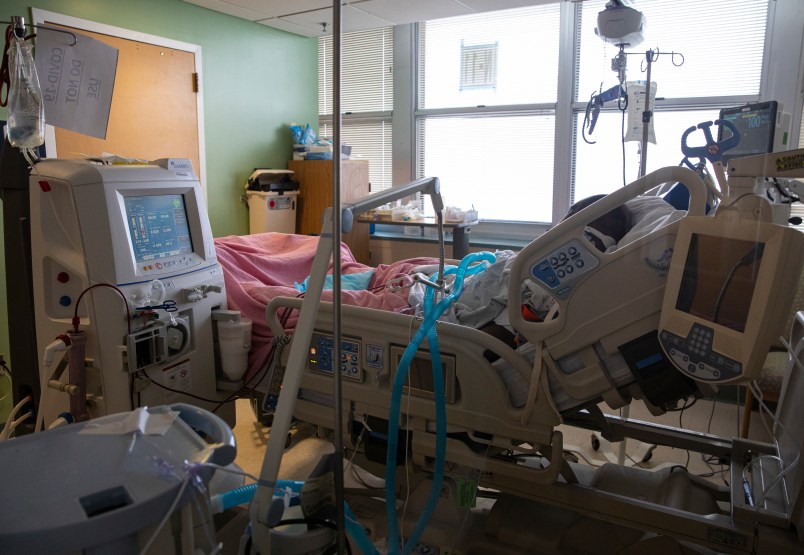We still don’t know how much we don’t know about COVID-19.
The immediate effects of the disease are devastating.But what has confronted doctors and patients alike since American hospitals began to fill up in March has been another, deeply sobering prospect: that of long-term, maybe permanent organ damage among those who contract severe COVID-19 infections.
“If you come out of COVID, you may actually realize or find out that you’re on dialysis, and that you have organ failure, and that it may not come back,” Paul T. Conway, chair of policy and global affairs and immediate past president of the American Association of Kidney Patients, told TPM. “It’s a highly frightening prospect.”
Patients leave stays at the ICU recovered from COVID-19, but often facing serious problems in vital organs including the kidneys and heart. Some patients develop arrhythmia, while others experience severe kidney issues that leave them on dialysis long after they’ve been intubated.
COVID-19 began as a respiratory illness, and long-term lung damage is one of the main, post-recovery risks. But as the disease has progressed around the world and deep into the U.S. population, the potential for long-term damage to other vital organs has come into stark relief.
Especially among those patients who have serious infections, organ complications targeting the heart and the kidney may be more widespread than previously thought. According to the American Society of Nephrology, between 40 and 60 percent of COVID-19 patients admitted to the ICU experience kidney problems. Meanwhile, a recent study based on the autopsies of COVID-19 patients in a German hospital found that the virus had clustered in the heart, lungs, liver, and kidneys.
Kidney issues can develop as the infection gets more serious, causing what’s known as an Acute Kidney Injury (AKI), a designation that includes a range of forms of damage that requires dialysis to treat.
“We’re seeing more kidney failure, more AKI, and it seems to be of a much more severe variety than we typically see with non-COVID critical illness,” National Kidney Foundation Chief Medical Officer Dr. Joseph Vassaloti told TPM.
The mechanism by which this occurs remains unclear, but doctors told TPM that the specific kind of kidney injury that COVID-19 deals on the body causes it to be harder to treat than other types.
The kidneys can normally be injured by many factors, including dehydration, Conway said. But the blood clotting that comes along with COVID-19 — slowing the flow of blood to vital organs — leads to a different set of problems.
“Even when they put the patient on the dialysis, the filter on the dialysis machine is getting clogged,” Conway said.
In these cases, the kidney itself can be physically damaged as the arteries split into smaller conduits for blood, preventing it from flowing through the organ.
Vassalotti, who is also a doctor at Mount Sinai Hospital in New York, added that other COVID-related effects may also be to blame for the damage that comes along with the disease: There is some evidence that the virus directly infects the kidney, and that the organ can become inflamed. In some cases, kidney cells themselves have died, causing the organ to stop functioning in what doctors call acute tubular necrosis.
He added to TPM that the difficulty of taking biopsies on patients so sick had made it more difficult to investigate the conditions quickly.
“There’s a huge range in terms of what we see of how the patients manifest the disease, how sick they are, which organs are involved,” Vassalotti said.
One Los Angeles critical care nurse treating COVID-19 patients, who spoke on condition of anonymity due to a lack of authorization to speak publicly from the employer, described patients arriving at the ICU with healthy organ function and waking up with kidney failure.
“It was a mystery at the beginning, because we all mistakenly thought it was just a respiratory virus,” the nurse said.
“This was flying below the radar when everyone was focused on the respiratory issues,” Conway told TPM, describing the last month as “watching medical history evolve.”
“How do you treat this on a large scale?” Conway added, referring to a surging need for dialysis machines.
The blood clotting issue remains under investigation. One promising study in New York City found that blood thinners boosted the survival chances of the sickest COVID-19 patients.
But it remains too early to tell how severe the damage will be, and if people will lose kidney function permanently or find it restored after lengthy dialysis.
“I think there’s going to be a huge spectrum of illness that we’re going to see in terms of the severity, the organs involved, the different ways that the infection plays out,” Vassalotti said.






